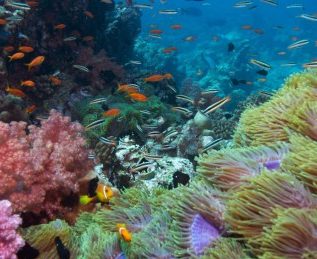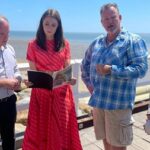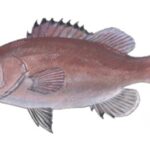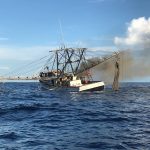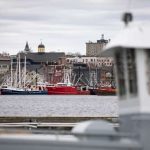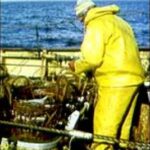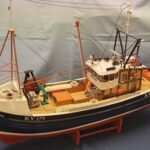Category Archives: Western Pacific
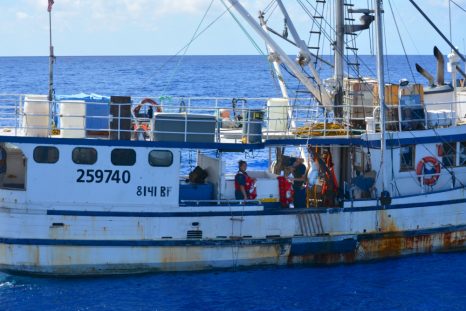
Coast Guard terminates voyages of 3 commercial fishing vessels for safety violations off Oahu
The crew of the USCGC Galveston Island (WPB-1349) terminated the voyages of the 79-foot Lady Jackie, the 62-foot commercial fishing vessel Blue Sky and the 82-foot Jennifer Lynn for hazardous conditions and safety violations during a boardings off Honolulu since Aug. 8. All three vessels were escorted by the Galveston Island crew to the pier in Honolulu. Coast Guard Sector Honolulu personnel are attending the vessels to ensure all discrepancies are rectified prior to any new voyages. The boarding team from the cutter found discrepancies aboard the vessels including inoperable high water alarms, inoperable and/or expired survival craft, expired distress signals, an expired emergency position indicating radio beacon, a lack of or unserviceable life jackets, crews untrained in first aid or emergency procedures and a failure to conduct regular drills. In one case there was excessive fuel in the bilge and in another the vessel’s commercial fishing vessel safety decal and their registration are both expired. More images, read the rest here 18:54
Expanding Antiquities Act Monument Would Set A Dangerous Precedent
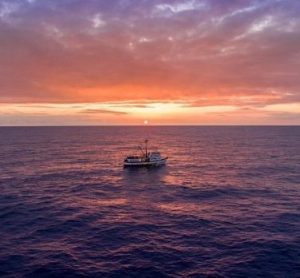 The National Oceanographic and Atmospheric Administration and U.S. Fish and Wildlife Service recently held a public meeting to discuss the proposed expansion of the Papahanaumokuakea Marine National Monument. Proponents of the expansion stand behind the request of and a group of seven Native Hawaiians for President Barack Obama to consider invoking the Antiquities Act of 1906 to expand the existing 50 mile monument boundary four-fold. The new monument would include nearly all of the Exclusive Economic Zone surrounding the Northwestern Hawaiian Islands and a whopping 60 percent of the greater Hawaiian Islands EEZ. In the case of Schatz’s proposal for monument expansion the concept of due process has been forsaken completely. The idea that sound science must be a basis for decision making has been abandoned in the face of a perceived urgency. Instead, the proposal has served to undermine the very structures we have in place to preserve a fair and equitable means of addressing public concerns about a shared resource (read up on Magnuson-Stevens Fisheries Conservation and Management Act.) Read the op-ed here 10:23
The National Oceanographic and Atmospheric Administration and U.S. Fish and Wildlife Service recently held a public meeting to discuss the proposed expansion of the Papahanaumokuakea Marine National Monument. Proponents of the expansion stand behind the request of and a group of seven Native Hawaiians for President Barack Obama to consider invoking the Antiquities Act of 1906 to expand the existing 50 mile monument boundary four-fold. The new monument would include nearly all of the Exclusive Economic Zone surrounding the Northwestern Hawaiian Islands and a whopping 60 percent of the greater Hawaiian Islands EEZ. In the case of Schatz’s proposal for monument expansion the concept of due process has been forsaken completely. The idea that sound science must be a basis for decision making has been abandoned in the face of a perceived urgency. Instead, the proposal has served to undermine the very structures we have in place to preserve a fair and equitable means of addressing public concerns about a shared resource (read up on Magnuson-Stevens Fisheries Conservation and Management Act.) Read the op-ed here 10:23
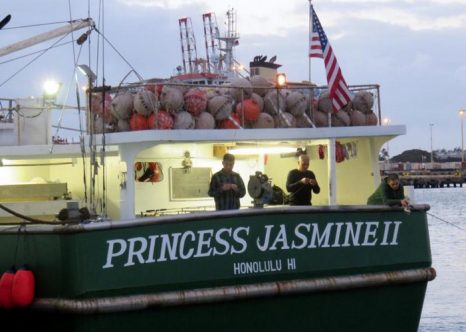
WPFMC asks for transparent analysis of proposed marine monument expansion
The Western Pacific Regional Fishery Management Council on Wednesday agreed to a resolution that asks the U.S. government to address a suite of concerns before acting on the proposed expansion on the Papahānaumokuākea Marine National Monument or MNM in the Northwestern Hawaiian Islands. Council members Suzanne Case, Hawaii Department of Land and Natural Resources chair, and Julie Leialoha, Conservation Council for Hawaii president, voted against the proposal. National Marine Fisheries Service or NMFS Pacific Islands Regional Administrator Michael Tosatto abstained. The resolution requests a “public, transparent, deliberative, documented and science-based process” to address the proposed expansion, which could prohibit fishing in two-thirds of the U.S. exclusive economic zone, i.e., waters out to 200 miles from shore, around Hawaii. The resolution is being sent to President Obama, the White House Council on Environmental Quality and the secretaries of Commerce, the Interior and State. Read the rest here 16:47
Ex-Parties to the Nauru agreement CEO says fish money wont last
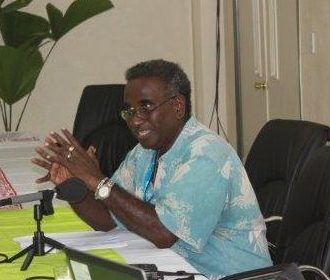 Members of the Parties to the Nauru agreement are reaping large returns off fishing vessel licenses but the PNA says the windfall won’t last forever. The eight member countries of the PNA and Tokelau employ a vessel day scheme which charges foreign ships at least US$8,000 a day to fish in their waters. High demand for the limited number of fishing days has sparked a bidding war between companies with some paying as much as US$16,000 per day. The outgoing CEO of the PNA, Transform Aqorau, said the demand reveals the value that could be obtained from fisheries but it would not last forever. Dr Aqorau also adds those who want to change the vessel day scheme should think carefully. Read the rest here 11:58
Members of the Parties to the Nauru agreement are reaping large returns off fishing vessel licenses but the PNA says the windfall won’t last forever. The eight member countries of the PNA and Tokelau employ a vessel day scheme which charges foreign ships at least US$8,000 a day to fish in their waters. High demand for the limited number of fishing days has sparked a bidding war between companies with some paying as much as US$16,000 per day. The outgoing CEO of the PNA, Transform Aqorau, said the demand reveals the value that could be obtained from fisheries but it would not last forever. Dr Aqorau also adds those who want to change the vessel day scheme should think carefully. Read the rest here 11:58
Enviro’s Complain Top Federal Fisheries Official Shouldn’t Be Meddling In Marine Monument Debate
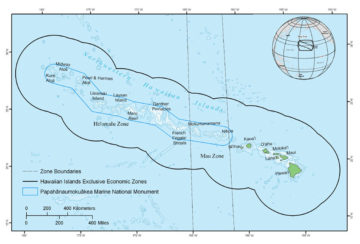 An environmental group has filed a complaint with federal officials over Western Pacific Regional Fishery Management Council Executive Director Kitty Simonds’ role in orchestrating opposition to the proposed expansion of the marine monument around the Northwestern Hawaiian Islands. Marjorie Ziegler, executive director of the Conservation Council for Hawaii, says Simonds is providing “the advocacy and the lobbying campaign” against the proposal to expand Papahanaumokuakea Marine National Monument. “It’s totally inappropriate for Kitty Simonds in her official capacity as executive director of Wespac – a taxpayer, federally funded entity – to play such a prominent role in an aggressive lobbying effort to generate public and political opposition to the proposed expansion,” Ziegler said Friday in an interview. The Conservation Council of Hawaii’s complaint was sent Friday to David Smith, deputy inspector general in the U.S. Department of Commerce’s Office of Inspector General, and Lois Schiffer, general counsel for the National Ocean and Atmospheric Administration. Read the story here 14:40
An environmental group has filed a complaint with federal officials over Western Pacific Regional Fishery Management Council Executive Director Kitty Simonds’ role in orchestrating opposition to the proposed expansion of the marine monument around the Northwestern Hawaiian Islands. Marjorie Ziegler, executive director of the Conservation Council for Hawaii, says Simonds is providing “the advocacy and the lobbying campaign” against the proposal to expand Papahanaumokuakea Marine National Monument. “It’s totally inappropriate for Kitty Simonds in her official capacity as executive director of Wespac – a taxpayer, federally funded entity – to play such a prominent role in an aggressive lobbying effort to generate public and political opposition to the proposed expansion,” Ziegler said Friday in an interview. The Conservation Council of Hawaii’s complaint was sent Friday to David Smith, deputy inspector general in the U.S. Department of Commerce’s Office of Inspector General, and Lois Schiffer, general counsel for the National Ocean and Atmospheric Administration. Read the story here 14:40
Akaka, Ariyoshi challenge expansion of Papahanaumokuakea National Marine Monument
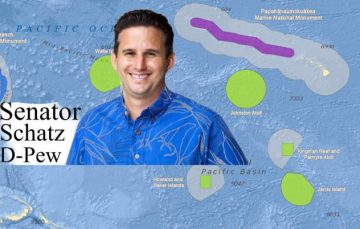 Government, community and business leaders rallied together at the state Capitol on Tuesday to address their opposition to the proposed expansion of a national marine monument. Among those who spoke at the rally were former Hawaii Gov. George Ariyoshi, former U.S. Sen. Daniel K. Akaka, D-Hawaii, Office of Hawaiian Affairs Trustee Peter Apo and other community and business organizations. On June 15, U.S. Sen. Brian Schatz, D-Hawaii, sent a proposal to President Barack Obama to expand Papahanaumokuakea, a fishing sanctuary and Marine National Monument, from 140,000 square miles to 583,000 square miles. If the expansion is implemented, PMNM will be the largest marine conservation in the world. During the rally, concerns against the expansion were shared that included the federal government’s rush to begin the project and the lack of effort in gathering the public’s opinion. “I feel it’s unconscionable for us to enact a new policy of expanding the Papahanaumokuakea without proper transparency,” Akaka said. “The people of Hawaii need to know what this is all about and they need to respond to it.” Read the rest here 19:53
Government, community and business leaders rallied together at the state Capitol on Tuesday to address their opposition to the proposed expansion of a national marine monument. Among those who spoke at the rally were former Hawaii Gov. George Ariyoshi, former U.S. Sen. Daniel K. Akaka, D-Hawaii, Office of Hawaiian Affairs Trustee Peter Apo and other community and business organizations. On June 15, U.S. Sen. Brian Schatz, D-Hawaii, sent a proposal to President Barack Obama to expand Papahanaumokuakea, a fishing sanctuary and Marine National Monument, from 140,000 square miles to 583,000 square miles. If the expansion is implemented, PMNM will be the largest marine conservation in the world. During the rally, concerns against the expansion were shared that included the federal government’s rush to begin the project and the lack of effort in gathering the public’s opinion. “I feel it’s unconscionable for us to enact a new policy of expanding the Papahanaumokuakea without proper transparency,” Akaka said. “The people of Hawaii need to know what this is all about and they need to respond to it.” Read the rest here 19:53
Papahanaumokuakea: Hawaii Fishermen get no response from Obama, Schatz
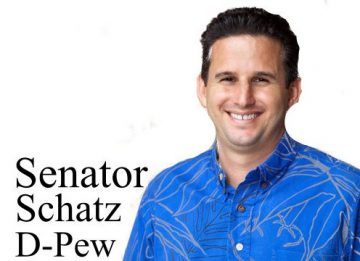 U.S. Sen. Brian Schatz, D-Hawaii, has yet to respond to a June 20th request to meet with the Western Pacific Regional Fishery Management Council on his proposal to expand the size of the Papahanaumokuakea Marine National Monument fourfold. Also unanswered are letters sent by the council to President Obama on April 8 and July 14, 2016, with concerns about the impact to Hawaii’s fisheries of the proposals by Schatz and by seven Native Hawaiians in January 2016 that the president expand the monument using his authority under the Antiquities Act. Council Chair Edwin Ebisui Jr., Executive Director Kitty M. Simonds and Vice Chairs McGrew Rice, William Sword, John Gourley and Michael Duenas reminded the Senator that the Council has federal jurisdiction over the waters within the Northwestern Hawaiian Islands beyond the current monument boundaries under the Magnuson-Stevens Fishery Conservation and Management Act of 1976. “We are dismayed that you did not consult with the prior to distribution of your letters, which have proliferated unsubstantiated statements through the media,” the council wrote to Schaltz. Read the rest here 10:13
U.S. Sen. Brian Schatz, D-Hawaii, has yet to respond to a June 20th request to meet with the Western Pacific Regional Fishery Management Council on his proposal to expand the size of the Papahanaumokuakea Marine National Monument fourfold. Also unanswered are letters sent by the council to President Obama on April 8 and July 14, 2016, with concerns about the impact to Hawaii’s fisheries of the proposals by Schatz and by seven Native Hawaiians in January 2016 that the president expand the monument using his authority under the Antiquities Act. Council Chair Edwin Ebisui Jr., Executive Director Kitty M. Simonds and Vice Chairs McGrew Rice, William Sword, John Gourley and Michael Duenas reminded the Senator that the Council has federal jurisdiction over the waters within the Northwestern Hawaiian Islands beyond the current monument boundaries under the Magnuson-Stevens Fishery Conservation and Management Act of 1976. “We are dismayed that you did not consult with the prior to distribution of your letters, which have proliferated unsubstantiated statements through the media,” the council wrote to Schaltz. Read the rest here 10:13
Coast Guard rescues 8 from burning fishing vessel off Oahu
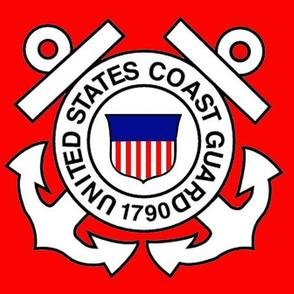 The Coast Guard rescued eight crewmembers from a burning ship two miles offshore Oahu, Thursday. Eight people are safe after a rescue and assist team from USCGC Galveston Island (WPB-1349) fought and extinguished an engineroom fire aboard commercial fishing vessel Lady Anna two miles south of Honolulu Harbor. “We were in the right place at the right time,” said Lt. Ryan Ball, commanding officer of USCGC Galveston Island. “This was a combined effort between the Galveston Island crew, the watchstanders at Sector Honolulu and rescue boat crews from Station Honolulu and Honolulu Fire Department. Watchstanders at Sector Honolulu Command Center overheard a transmission on VHF channel 16 at 4:30 p.m. regarding a fire aboard the 78-foot fishing vessel Lady Anna. Watchstanders established communication with the vessel, directed the launch of a 45-foot Response Boat-Medium crew from Station Honolulu and diverted the nearby Galveston Island crew to assist. Read the story here 07:59
The Coast Guard rescued eight crewmembers from a burning ship two miles offshore Oahu, Thursday. Eight people are safe after a rescue and assist team from USCGC Galveston Island (WPB-1349) fought and extinguished an engineroom fire aboard commercial fishing vessel Lady Anna two miles south of Honolulu Harbor. “We were in the right place at the right time,” said Lt. Ryan Ball, commanding officer of USCGC Galveston Island. “This was a combined effort between the Galveston Island crew, the watchstanders at Sector Honolulu and rescue boat crews from Station Honolulu and Honolulu Fire Department. Watchstanders at Sector Honolulu Command Center overheard a transmission on VHF channel 16 at 4:30 p.m. regarding a fire aboard the 78-foot fishing vessel Lady Anna. Watchstanders established communication with the vessel, directed the launch of a 45-foot Response Boat-Medium crew from Station Honolulu and diverted the nearby Galveston Island crew to assist. Read the story here 07:59
Hawaii’s longline fleet hits Bigeye tuna quota early
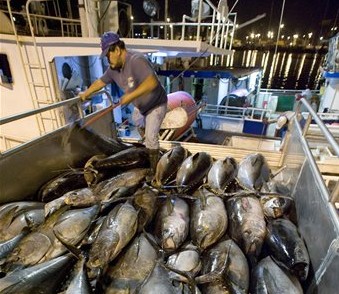 The longline fleet, nearly all of which is based in Honolulu, will now have to travel farther to fish for bigeye, a factor that could lead to better prices for Big Island fisherman bringing in tuna with handlines. Fishing quotas are set years in advance by the Western Pacific Fisheries Commission, an international group of 27 countries. They are based on historical levels of catch “and then reduced quite a bit,” said Eric Kingma, international fisheries enforcement coordinator for the Western Pacific Fisheries Management Council. Hawaii’s longline fleet makes up about 3 percent of the worldwide bigeye catch. It’s not clear why this year’s quota of 3,554 metric tons was reached so early. Last year, the fishery closed in August, the earliest the region had ever been restricted. “It’s the same number of hooks (in the water),” said Hawaii Longline Association president Sean Martin. Catch rates are 40 percent higher than historical numbers, he said. Read the rest here 14:16
The longline fleet, nearly all of which is based in Honolulu, will now have to travel farther to fish for bigeye, a factor that could lead to better prices for Big Island fisherman bringing in tuna with handlines. Fishing quotas are set years in advance by the Western Pacific Fisheries Commission, an international group of 27 countries. They are based on historical levels of catch “and then reduced quite a bit,” said Eric Kingma, international fisheries enforcement coordinator for the Western Pacific Fisheries Management Council. Hawaii’s longline fleet makes up about 3 percent of the worldwide bigeye catch. It’s not clear why this year’s quota of 3,554 metric tons was reached so early. Last year, the fishery closed in August, the earliest the region had ever been restricted. “It’s the same number of hooks (in the water),” said Hawaii Longline Association president Sean Martin. Catch rates are 40 percent higher than historical numbers, he said. Read the rest here 14:16
Zeldin amendment helps the Nation’s Fishermen, prevents abuse of the Antiquities Act of 1906
 The amendment bars funding for the designation of any national marine monuments by the president in the Exclusive Economic Zone. Marine monuments are areas of ocean where fishing would be banned without consulting the local community, fishermen, or regional fisheries managers. Mr. Zeldin in a release said the Obama administration’s “overzealous interpretation of this law is causing great concern” among the fishing community because the president has sought to apply his power to vast portions of the ocean. In 2014, he said the president declared a 407,000-square-mile National Marine Monument in the Pacific Ocean where commercial fishing was banned and recreational fishing was severely limited. Now, important fishing areas in the Northwest Atlantic, where fishermen from Greenport and Montauk have long worked, are under consideration with little public input and no transparency. Bonnie Brady, the executive director of the Long Island Commercial Fishing Association, “These are the critical waters that Mr. Zeldin’s amendment will protect.” Read the rest here 08:07
The amendment bars funding for the designation of any national marine monuments by the president in the Exclusive Economic Zone. Marine monuments are areas of ocean where fishing would be banned without consulting the local community, fishermen, or regional fisheries managers. Mr. Zeldin in a release said the Obama administration’s “overzealous interpretation of this law is causing great concern” among the fishing community because the president has sought to apply his power to vast portions of the ocean. In 2014, he said the president declared a 407,000-square-mile National Marine Monument in the Pacific Ocean where commercial fishing was banned and recreational fishing was severely limited. Now, important fishing areas in the Northwest Atlantic, where fishermen from Greenport and Montauk have long worked, are under consideration with little public input and no transparency. Bonnie Brady, the executive director of the Long Island Commercial Fishing Association, “These are the critical waters that Mr. Zeldin’s amendment will protect.” Read the rest here 08:07
Pew Calls for 2 year moratorium on Commercial Fishing of Pacific Bluefin Tuna
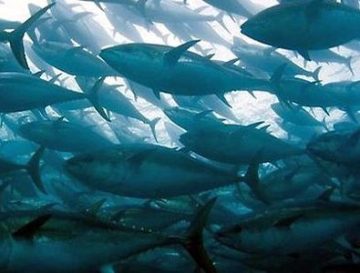 The Pew Charitable Trusts today called for a two-year moratorium on commercial fishing of the highly depleted Pacific bluefin tuna. In this year’s stock assessment, scientists found that the population is at just 2.6 percent of its historic size and that overall fishing mortality remains up to three times higher than is sustainable. Despite that dire state, the two international bodies that manage Pacific bluefin—the Inter-American Tropical Tuna Commission, which met this month in California, and the Western and Central Pacific Fisheries Commission, which meets in December in Fiji—have failed for several years to agree on a Pacific-wide recovery plan that will end overfishing and return the population to healthy levels. Projections from the International Scientific Committee for Tuna and Tuna-like Species in the North Pacific Ocean show that under current conditions, the catch limits now in place have a less than 1 percent chance of successfully rebuilding the population over the next 20 years. Read the rest here 16:27
The Pew Charitable Trusts today called for a two-year moratorium on commercial fishing of the highly depleted Pacific bluefin tuna. In this year’s stock assessment, scientists found that the population is at just 2.6 percent of its historic size and that overall fishing mortality remains up to three times higher than is sustainable. Despite that dire state, the two international bodies that manage Pacific bluefin—the Inter-American Tropical Tuna Commission, which met this month in California, and the Western and Central Pacific Fisheries Commission, which meets in December in Fiji—have failed for several years to agree on a Pacific-wide recovery plan that will end overfishing and return the population to healthy levels. Projections from the International Scientific Committee for Tuna and Tuna-like Species in the North Pacific Ocean show that under current conditions, the catch limits now in place have a less than 1 percent chance of successfully rebuilding the population over the next 20 years. Read the rest here 16:27
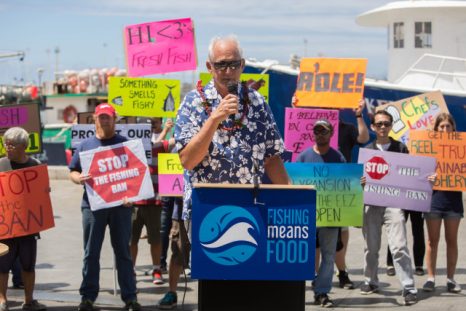
Former Hawaii Gov. George Ariyoshi, Chefs Protest Marine Monument Expansion
Set against a backdrop of commercial fishing boats at Pier 38 in Honolulu, former Hawaii Gov. George Ariyoshi told a crowd of roughly 200 people Friday that they need to work together to stop the proposed expansion of Papahanaumokuakea Marine National Monument. “We should not let the federal government come in and tell us what to do with our ocean,” the 90-year-old Ariyoshi said, receiving a round of applause. It was the biggest rally to date against expanding the monument around the Northwestern Hawaiian Islands. Some waved signs saying “Fishing Means Food” and “MVP Most Valuable Poke.” Top chefs like Nico Chaize and George Mavrothalassitis were on hand, along with longline fishermen who object to a further encroachment on their fishing grounds. Read the rest here 18:33
Hawaii fishing, restaurant industries hold rally to protest expansion of fishing ban
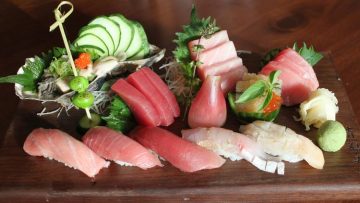 Fishing Means Food, a coalition representing Hawaii’s fishing industry, along with Hawaii chefs, restaurant owners and public figures such as former Gov. George Ariyoshi and Peter Apo, a trustee with the Office of Hawaiian Affairs, is holding a rally on Friday to protest a proposed expansion of the Papahanaumokuakea Marine National Monument and its fishing ban. The rally will be held at 11 a.m. at the Honolulu Fish Auction at Pier 38. The coalition says the expanded fishing ban will push Hawaii’s 140 active commercial fishing boats into international waters where they’ll be forced to compete with less regulated foreign fishing vessels. The expanded ban could reduce the supply of fresh, locally caught fish, impacting such businesses as restaurants, poke shops and wholesalers. Link 08:07
Fishing Means Food, a coalition representing Hawaii’s fishing industry, along with Hawaii chefs, restaurant owners and public figures such as former Gov. George Ariyoshi and Peter Apo, a trustee with the Office of Hawaiian Affairs, is holding a rally on Friday to protest a proposed expansion of the Papahanaumokuakea Marine National Monument and its fishing ban. The rally will be held at 11 a.m. at the Honolulu Fish Auction at Pier 38. The coalition says the expanded fishing ban will push Hawaii’s 140 active commercial fishing boats into international waters where they’ll be forced to compete with less regulated foreign fishing vessels. The expanded ban could reduce the supply of fresh, locally caught fish, impacting such businesses as restaurants, poke shops and wholesalers. Link 08:07
Hawaii’s longline fleet about to hit its 3,554-ton bigeye tuna limit, enviro scorned rule will keep them fishing
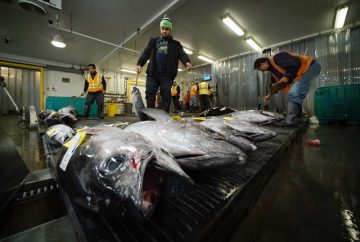 Hawaii’s longline fleet is about to hit its 3,554-ton limit for bigeye tuna in the Western and Central Pacific, prompting a closure date for the fishery of July 22, according to the National Oceanic and Atmospheric Administration. The longliners had caught an estimated 98 percent of their annual quota by Wednesday, National Marine Fisheries Service reported. The feds had been predicting longliners would hit their bigeye tuna limit by Aug. 14. But the closure will likely be short-lived thanks to a federal rule that proposes, like in years past, allowing U.S. Pacific Island territories — American Samoa, Guam and the Commonwealth of the Northern Mariana Islands — to each allocate up to 1,000 tons of their 2,000-ton quotas to U.S. longliners under a “specified fishing agreement.” David Henkin, staff attorney for Earthjustice, a nonprofit environmental law organization, calls it a “shell game” that allows overfishing, but the courts have so far disagreed. Read the rest here 10:23
Hawaii’s longline fleet is about to hit its 3,554-ton limit for bigeye tuna in the Western and Central Pacific, prompting a closure date for the fishery of July 22, according to the National Oceanic and Atmospheric Administration. The longliners had caught an estimated 98 percent of their annual quota by Wednesday, National Marine Fisheries Service reported. The feds had been predicting longliners would hit their bigeye tuna limit by Aug. 14. But the closure will likely be short-lived thanks to a federal rule that proposes, like in years past, allowing U.S. Pacific Island territories — American Samoa, Guam and the Commonwealth of the Northern Mariana Islands — to each allocate up to 1,000 tons of their 2,000-ton quotas to U.S. longliners under a “specified fishing agreement.” David Henkin, staff attorney for Earthjustice, a nonprofit environmental law organization, calls it a “shell game” that allows overfishing, but the courts have so far disagreed. Read the rest here 10:23
Western Pacific Fishery Management Council takes issue with Hawaii Senator Brian Schatz
 Hawaii Senator Brian Schatz has received a strongly worded letter from the Western Pacific Fishery Management Council concerning his support of the proposed expansion of the Papahanaumokuakea Marine National Monument in the Northwestern Hawaiian islands. A local fishermen who has been following the debate on the proposed expansion says we should be concerned with what’s happening with Hawaii’s fishery because we are next. He says the Hawaii Monument expansion, just like the designation of the Remote Pacific Islands Monument and expansion of the National Marine Sanctuary of American Samoa are examples of the influence of funding by special interest groups such as the Pew Foundation. Read the rest here 13:35
Hawaii Senator Brian Schatz has received a strongly worded letter from the Western Pacific Fishery Management Council concerning his support of the proposed expansion of the Papahanaumokuakea Marine National Monument in the Northwestern Hawaiian islands. A local fishermen who has been following the debate on the proposed expansion says we should be concerned with what’s happening with Hawaii’s fishery because we are next. He says the Hawaii Monument expansion, just like the designation of the Remote Pacific Islands Monument and expansion of the National Marine Sanctuary of American Samoa are examples of the influence of funding by special interest groups such as the Pew Foundation. Read the rest here 13:35
The Northwestern Hawaiian Islands monument expansion should be opposed – Lyn McNutt
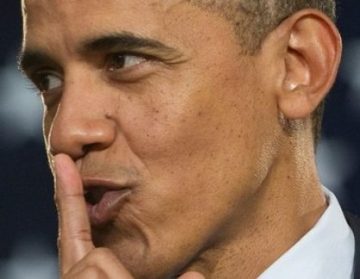 If you eliminate the U.S. (Hawaiian) fishery, then the area will be completely open to Illegal, Unregulated, Unreported (IUU) fisheries. U.S. fishers are regulated in equipment, species interactions (takes), amount of fish caught and they have VMS onboard as well as observers. The White House supposedly wants to regulate IUU fishing, but this action opens the door for IUU in the area. Who will stop IUU and how will they enforce rules? The state of Hawaii (DLNR) is very quick to claim how they are trying to create a “community” managed system of fisheries ecosystem management with consultation and community involvement in the planning, implementation and operation of community-based fishing. This top-down edict is a complete 180 from “community.” The Antiquities Act does not require any public input. A small group is forcing their view on the people of Hawaii Nei without any discussion of the public (local — not Mainland) perception on the use of the area. This is not pono. Read the op-ed here 10:31
If you eliminate the U.S. (Hawaiian) fishery, then the area will be completely open to Illegal, Unregulated, Unreported (IUU) fisheries. U.S. fishers are regulated in equipment, species interactions (takes), amount of fish caught and they have VMS onboard as well as observers. The White House supposedly wants to regulate IUU fishing, but this action opens the door for IUU in the area. Who will stop IUU and how will they enforce rules? The state of Hawaii (DLNR) is very quick to claim how they are trying to create a “community” managed system of fisheries ecosystem management with consultation and community involvement in the planning, implementation and operation of community-based fishing. This top-down edict is a complete 180 from “community.” The Antiquities Act does not require any public input. A small group is forcing their view on the people of Hawaii Nei without any discussion of the public (local — not Mainland) perception on the use of the area. This is not pono. Read the op-ed here 10:31
Who’s Behind A Stealth Ad Against The Marine Monument Expansion?
 The author seems to believe a stealth video created by an unknown source, most likely a very tiny group of individuals and citizens with a very meager budget, is outrageous, and destructive to a cause created by a billion dollar ENGO PEW, that has unlimited resources, paid soldiers, and a mega network of PEW spawned ENGO’s like Oceana, EDF! Burgeoning grass-root groups are ramping up their campaigns for and against the proposed expansion of Papahanaumokuakea Marine National Monument as President Obama weighs whether he should single-handedly create the world’s biggest marine reserve around the Northwestern Hawaiian Islands. Civil Beat requested lists from both groups — Expand Papahanaumokuakea and Fishing Means Food — to better assess who actually backs the campaigns. Read the rest here 09:54
The author seems to believe a stealth video created by an unknown source, most likely a very tiny group of individuals and citizens with a very meager budget, is outrageous, and destructive to a cause created by a billion dollar ENGO PEW, that has unlimited resources, paid soldiers, and a mega network of PEW spawned ENGO’s like Oceana, EDF! Burgeoning grass-root groups are ramping up their campaigns for and against the proposed expansion of Papahanaumokuakea Marine National Monument as President Obama weighs whether he should single-handedly create the world’s biggest marine reserve around the Northwestern Hawaiian Islands. Civil Beat requested lists from both groups — Expand Papahanaumokuakea and Fishing Means Food — to better assess who actually backs the campaigns. Read the rest here 09:54
Can 1,500 Scientists All Be Wrong urging Obama to expand Papahanaumokuakea Marine National Monument?
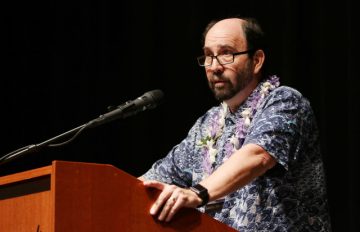 More than 1,500 scientists from around the world have signed a letter urging President Obama to use his executive authority to expand Papahanaumokuakea Marine National Monument in the Northwestern Hawaiian Islands. “There is a growing consensus among marine scientists that 30% of the oceans be set aside for adequate protection against human exploitation, yet only two percent presently benefits from full protection,” the letter said. The group said expanding the monument from the current 50-mile boundary to the full 200-mile allowable limit as proposed would be a “substantial step in the right direction, creating the largest reserve in the world.” Read the scientists’ letter to the president, along with a list of everyone who signed it. Read the rest here 09:00
More than 1,500 scientists from around the world have signed a letter urging President Obama to use his executive authority to expand Papahanaumokuakea Marine National Monument in the Northwestern Hawaiian Islands. “There is a growing consensus among marine scientists that 30% of the oceans be set aside for adequate protection against human exploitation, yet only two percent presently benefits from full protection,” the letter said. The group said expanding the monument from the current 50-mile boundary to the full 200-mile allowable limit as proposed would be a “substantial step in the right direction, creating the largest reserve in the world.” Read the scientists’ letter to the president, along with a list of everyone who signed it. Read the rest here 09:00
Tagging tuna – The Ahi Satellite Tagging Project of the Pacific Island Fisheries Group
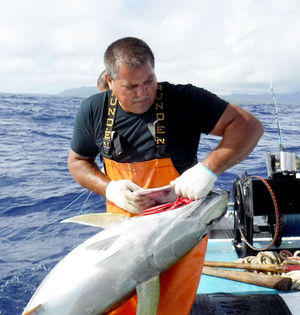 A respected research professor, scientist and part-time resident has been on Kauai for several weeks coordinating the latest phase of a tuna tagging project launched on Kauai and the Big Island three years ago. Dr. Molly Lutcavage is a research professor at the University of Massachusetts Boston’s School for the Environment. She is also director of the Large Pelagic Research Center and is renowned for her extensive work with the Atlantic bluefin tuna fishing community. The Ahi Satellite Tagging Project of the Pacific Island Fisheries Group is a joint venture that uses state-of-the art technology and partners fisheries organizations, policy makers and local fishermen in the effort to gather much-needed baseline data on ahi and other pelagic fish that live and migrate in waters surrounding the main Hawaiian islands and beyond. Read the rest here 09:15
A respected research professor, scientist and part-time resident has been on Kauai for several weeks coordinating the latest phase of a tuna tagging project launched on Kauai and the Big Island three years ago. Dr. Molly Lutcavage is a research professor at the University of Massachusetts Boston’s School for the Environment. She is also director of the Large Pelagic Research Center and is renowned for her extensive work with the Atlantic bluefin tuna fishing community. The Ahi Satellite Tagging Project of the Pacific Island Fisheries Group is a joint venture that uses state-of-the art technology and partners fisheries organizations, policy makers and local fishermen in the effort to gather much-needed baseline data on ahi and other pelagic fish that live and migrate in waters surrounding the main Hawaiian islands and beyond. Read the rest here 09:15
US Tuna Treaty survives, new deal for 2017 – Tunaboat Association comments on fishing pact
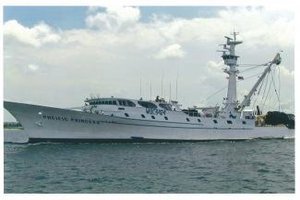 The US Tuna Treaty has survived after 18 negotiation meetings over the last seven years, with the latest one just concluded in Auckland, New Zealand. The multilateral Treaty is important for American Samoa because it allows US puirse seiners that supply our two canneries to fish in the exclusive economic zones of island countries that are close by. Read the rest here Tunaboat Association comments on fishing pact – The President of the American Tunaboat Association, Brian Hallman, says the fishing agreement reached over the weekend in Zealand between the United States and Pacific Island countries is from the point of view of the US fleet, the best outcome they could have achieved under difficult circumstances. Read the rest here Tri Marine looks to build coalition – Tri Marine International, which operates the Samoa Tuna Processors cannery in Atuu, says it has been anticipating a change in how the US purse seiners would manage access to the tuna fishing grounds in the Western and Central Pacific for several years. Chief Operating Officer of Tri Marine, Joe Hamby, says now that the future of the US South Pacific Tuna Treaty has been resolved, “we will be able to focus on building a coalition of fishing companies and resource owners committed to supporting American Samoa as a regional tuna processing hub.” Read the rest here 19:55
The US Tuna Treaty has survived after 18 negotiation meetings over the last seven years, with the latest one just concluded in Auckland, New Zealand. The multilateral Treaty is important for American Samoa because it allows US puirse seiners that supply our two canneries to fish in the exclusive economic zones of island countries that are close by. Read the rest here Tunaboat Association comments on fishing pact – The President of the American Tunaboat Association, Brian Hallman, says the fishing agreement reached over the weekend in Zealand between the United States and Pacific Island countries is from the point of view of the US fleet, the best outcome they could have achieved under difficult circumstances. Read the rest here Tri Marine looks to build coalition – Tri Marine International, which operates the Samoa Tuna Processors cannery in Atuu, says it has been anticipating a change in how the US purse seiners would manage access to the tuna fishing grounds in the Western and Central Pacific for several years. Chief Operating Officer of Tri Marine, Joe Hamby, says now that the future of the US South Pacific Tuna Treaty has been resolved, “we will be able to focus on building a coalition of fishing companies and resource owners committed to supporting American Samoa as a regional tuna processing hub.” Read the rest here 19:55
South Pacific Tuna Treaty renegotiation session concluded successfully
 The most recent South Pacific Tuna Treaty renegotiation session concluded successfully on Saturday, June 25, 2016. Negotiators from the United States and representatives of the 16 Pacific Island parties reached agreement in principle on changes to the 27-year-old Tuna Treaty and the terms of fishing access for the U.S. purse seine fleet to Pacific Island waters through 2022. The proposed agreement would establish more flexible procedures for commercial cooperation between U.S. industry and Pacific Island parties. The outcome reflects strong cooperation between the parties to the Treaty and relevant stakeholders, and a mutual commitment to the broader positive relationship between the United States and the Pacific Island region. Read the rest here 09:46
The most recent South Pacific Tuna Treaty renegotiation session concluded successfully on Saturday, June 25, 2016. Negotiators from the United States and representatives of the 16 Pacific Island parties reached agreement in principle on changes to the 27-year-old Tuna Treaty and the terms of fishing access for the U.S. purse seine fleet to Pacific Island waters through 2022. The proposed agreement would establish more flexible procedures for commercial cooperation between U.S. industry and Pacific Island parties. The outcome reflects strong cooperation between the parties to the Treaty and relevant stakeholders, and a mutual commitment to the broader positive relationship between the United States and the Pacific Island region. Read the rest here 09:46
Expanding monument will do more harm than good – Shane Yoshimoto, Honolulu
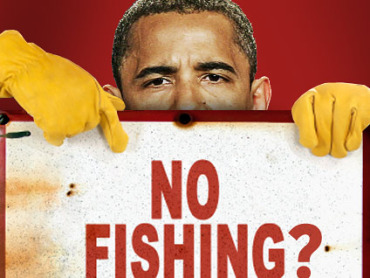 I am writing regarding the proposal to expand the Papahanaumokuakea Marine National Monument and to ban commercial fishing there. I work in Hawaii’s fishing industry, but besides it being my livelihood it’s my love and passion. Fish isn’t just a source of food to me or the people of Hawaii; it’s a huge part of the culture. Hawaii’s fishing industry and economy will be impacted if this monument is expanded. I am strongly opposed to the expansion of this monument. We are already limited on locally sourced foods and this would take a significant amount of fresh fish away from Hawaii. Read the rest here 14:04
I am writing regarding the proposal to expand the Papahanaumokuakea Marine National Monument and to ban commercial fishing there. I work in Hawaii’s fishing industry, but besides it being my livelihood it’s my love and passion. Fish isn’t just a source of food to me or the people of Hawaii; it’s a huge part of the culture. Hawaii’s fishing industry and economy will be impacted if this monument is expanded. I am strongly opposed to the expansion of this monument. We are already limited on locally sourced foods and this would take a significant amount of fresh fish away from Hawaii. Read the rest here 14:04
U.S. Commerce Department announces 2016 regional fishery council appointments
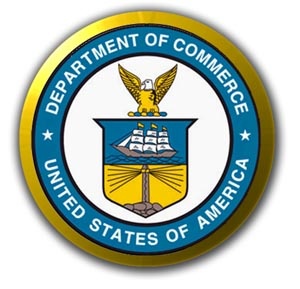 The U.S. Commerce Department today announced the appointment of 19 new and returning members to the eight regional fishery management councils that partner with NOAA Fisheries to manage ocean fish stocks. One at-large seat on the Mid-Atlantic Council will be announced by the Secretary at a later date. The new and reappointed council members begin their three-year terms on August 11. Each year, the Secretary of Commerce appoints approximately one-third of the total 72 appointed members to the eight regional councils. The Secretary selects members from nominations submitted by the governors of fishing states, territories and tribal governments. Council members are appointed to both obligatory (state-specific) and at-large (regional) seats. Council members serve a three-year term and can get reappointed to serve three consecutive terms. Asterisks preceding a member’s name indicate a reappointment. Read it here 17:24
The U.S. Commerce Department today announced the appointment of 19 new and returning members to the eight regional fishery management councils that partner with NOAA Fisheries to manage ocean fish stocks. One at-large seat on the Mid-Atlantic Council will be announced by the Secretary at a later date. The new and reappointed council members begin their three-year terms on August 11. Each year, the Secretary of Commerce appoints approximately one-third of the total 72 appointed members to the eight regional councils. The Secretary selects members from nominations submitted by the governors of fishing states, territories and tribal governments. Council members are appointed to both obligatory (state-specific) and at-large (regional) seats. Council members serve a three-year term and can get reappointed to serve three consecutive terms. Asterisks preceding a member’s name indicate a reappointment. Read it here 17:24
Antiquities Act abuse heads East – U.S. Rep. Rob Bishop (R-Utah)
 Some say cultural trends start on the West Coast and make their way East, but one trend moving eastward is bad news for New Englanders. In my home state of Utah, the federal government owns 65 percent of the land. That is a problem. In the waning days of his administration, President Clinton compounded the problem by mandating the Grand Staircase Escalante National Monument. With virtually no local support, he locked up 1.7 million acres of Utah, an area larger than some states. This monument designation was an abuse of the Antiquities Act. Passed in 1906, the Antiquities Act was originally intended for presidents to quickly prevent looting of archaeological sites. The executive power exercised under the Antiquities Act has grown far beyond the original purpose.,, The same story threads throughout the West, most recently in February when President Obama — who has designated the highest acreage of national monument land and water of any U.S. president — designated three different national monuments in the California desert. Now the president has his sights set on New England fisheries off the coast of Cape Cod. Read the rest here 08:46
Some say cultural trends start on the West Coast and make their way East, but one trend moving eastward is bad news for New Englanders. In my home state of Utah, the federal government owns 65 percent of the land. That is a problem. In the waning days of his administration, President Clinton compounded the problem by mandating the Grand Staircase Escalante National Monument. With virtually no local support, he locked up 1.7 million acres of Utah, an area larger than some states. This monument designation was an abuse of the Antiquities Act. Passed in 1906, the Antiquities Act was originally intended for presidents to quickly prevent looting of archaeological sites. The executive power exercised under the Antiquities Act has grown far beyond the original purpose.,, The same story threads throughout the West, most recently in February when President Obama — who has designated the highest acreage of national monument land and water of any U.S. president — designated three different national monuments in the California desert. Now the president has his sights set on New England fisheries off the coast of Cape Cod. Read the rest here 08:46
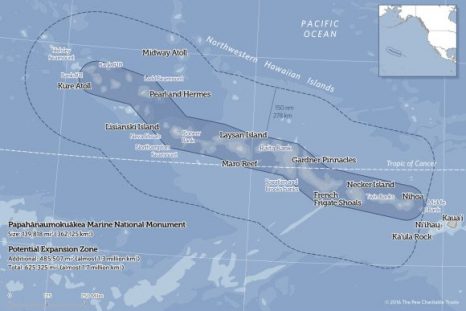
Peter Apo: Obama Should Say No To Expanded Marine Monument
President Obama is considering a request to more than quadruple the size of the Papahanaumokuakea Marine National Monument in the Northwestern Hawaiian Islands to 580,000 square miles – an area as large as the states of Texas, California and Montana. If Obama takes this step, the federal government essentially would assert control over hundreds of thousands of miles of ocean around Hawaii with no public discussion. According to the Antiquities Act of 1906, the trigger to designate an area as a national monument is simply the president’s signature. No discussion required — not by Congress, not by state government and not by citizens who rely on the targeted geo-cultural area. Read the story here 16:11
Scientist sees no benefit in expansion of Papahanaumokuakea Monument
 A senior scientist from the Western Pacific Regional Fishery Management Council says there’s no conservation benefits in expanding Hawaii’s protected waters. Council members are opposing the plan to expand the Papahanaumokuakea Monument saying it would be detrimental to Hawaii’s economy, food security and food production. An executive order, issued by President Obama in 2014, would increase the Monument five-fold and reduce the available fishing grounds in the exclusive economic zone around Hawaii from 63 to 15 percent. The scientist, Paul Dalzell, said claims that the monument’s expansion would improve conservation were false. He says, “It will not improve things for fisheries or for the abundance of marine fish. “For a start off, it’s open ocean so pelagic species just swim through it. It won’t pile up there and then replenish fish stocks around the main Hawaiians.” Link 16:19
A senior scientist from the Western Pacific Regional Fishery Management Council says there’s no conservation benefits in expanding Hawaii’s protected waters. Council members are opposing the plan to expand the Papahanaumokuakea Monument saying it would be detrimental to Hawaii’s economy, food security and food production. An executive order, issued by President Obama in 2014, would increase the Monument five-fold and reduce the available fishing grounds in the exclusive economic zone around Hawaii from 63 to 15 percent. The scientist, Paul Dalzell, said claims that the monument’s expansion would improve conservation were false. He says, “It will not improve things for fisheries or for the abundance of marine fish. “For a start off, it’s open ocean so pelagic species just swim through it. It won’t pile up there and then replenish fish stocks around the main Hawaiians.” Link 16:19
Obama’s moving closer to creating the world’s largest marine reserve — in Hawaii
 Obama may have chosen to locate his library in his adopted home state of Illinois, but a new move by Sen. Brian Schatz (D-Hawaii) suggests he may leave his biggest environmental footprint in his home state of Hawaii. Schatz sent a letter Thursday to the president asking him to consider expanding the Papahānaumokuākea Marine National Monument, which President George W. Bush created a decade ago, to more than four times its current size of 139,800 square miles. The senator, who has emerged as a key broker between Hawaiian fishing and other local interests and the federal government, has included a carve-out in his proposal so recreational and subsistence fishing operators from Kaua‘i and Ni‘ihau can continue to use certain areas that are outside the monument’s current boundaries. An active fishing spot around the National Oceanic and Atmospheric Administration’s weather buoy 51101 would remain open, though all the areas within the expanded monument would be closed to fishing or other forms of exploitation such as deep-sea mining. Read the rest here 08:05
Obama may have chosen to locate his library in his adopted home state of Illinois, but a new move by Sen. Brian Schatz (D-Hawaii) suggests he may leave his biggest environmental footprint in his home state of Hawaii. Schatz sent a letter Thursday to the president asking him to consider expanding the Papahānaumokuākea Marine National Monument, which President George W. Bush created a decade ago, to more than four times its current size of 139,800 square miles. The senator, who has emerged as a key broker between Hawaiian fishing and other local interests and the federal government, has included a carve-out in his proposal so recreational and subsistence fishing operators from Kaua‘i and Ni‘ihau can continue to use certain areas that are outside the monument’s current boundaries. An active fishing spot around the National Oceanic and Atmospheric Administration’s weather buoy 51101 would remain open, though all the areas within the expanded monument would be closed to fishing or other forms of exploitation such as deep-sea mining. Read the rest here 08:05
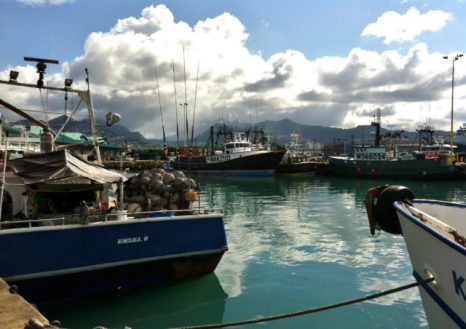
Would Hawaii Marine Monument Expansion Hurt The Tuna Industry?
Conservationists and others are crying foul over letters that state lawmakers recently sent President Obama that urged him to not consider expanding the Northwestern Hawaiian Islands Marine National Monument. They’re specifically concerned about the numbers used to justify opposition, calling the estimated $7 million financial hit to the longline tuna fishing industry misleading at best. “It’s just a false logic to suggest that a mobile fishery resource has to be fished in this particular location,” said David Henkin, staff attorney for Earthjustice, a nonprofit environmental law organization. “You’re talking about catching fish,” Henkin said. “You’re not cutting down trees. You’re not mining for gold.” Representatives of the longline fishing industry say it’s not so much about how much money from ahi they would potentially lose if the monument is expanded as it is about the government further limiting the places they can fish. “The fact of the matter is that we continue to be squeezed out of traditional areas,” said Sean Martin, president of the Hawaii Longline Association. Read the story here 08:04






